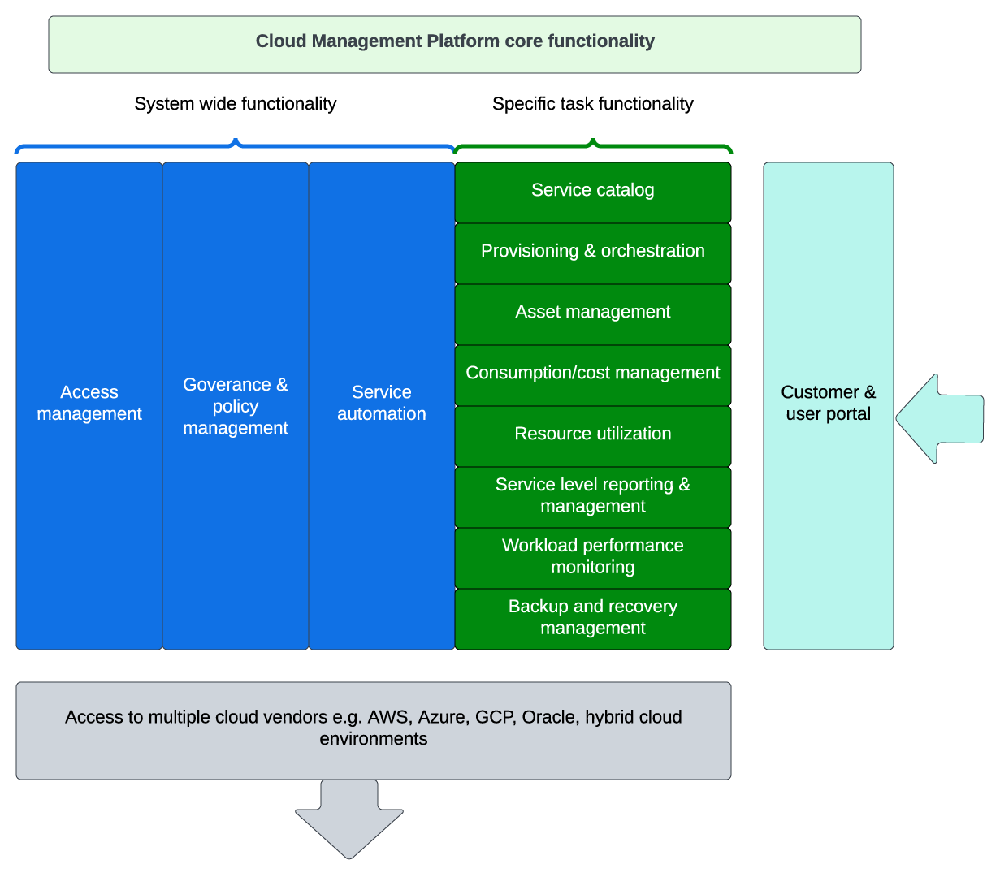Cloud management platforms: a core component in growing your managed services business
Amarnath Gutta
Senior Consultant, ISSI

Customer Success Practice Blog Series #6
In our work with partners through workshops, auditing, and consultations, ISSI encounters a lot of questions— and sometimes confusion—about cloud management platforms (CMPs). It's understandable. Only a few years ago, you heard little about cloud management.
That's changed a lot. The CMP market is growing rapidly and there's an increasingly large number of native, purpose-built, and third-party tools available. This creates a complex decision-making process for channel partners working with hyperscale vendors such as AWS, Azure, and GCP. Yet it's not always clear what a CMP is and what it means for partners moving forward.
Let me try to clarify. I'll start with a definition, and then briefly discuss the main reasons for the recent growth in the CMP market. I'll talk about how partners can view CMPs not as a cost centers but as revenue opportunities, and I'll go over the important questions partners should ask about CMPs when they are deciding what tools to use.
What Is A CMP: New Tools To Address Cloud Maturity
Gartner defines CMPs as "integrated products that provide for the management of public, private, and hybrid cloud environments." At a minimum, a CMP should include functions for self-service interfaces and provisioning system images. They should enable metering and billing and provide some degree of workload optimization through established policies.
The diagram below illustrates the broad range of services provided by a CMP. MSPs will typically choose to implement all these services or a subset depending on their market requirements. In the MSP environment, the CMP is the key interface between the customer, MSP, and cloud vendor.

The growth of the cloud in recent years helps explain the parallel growth in CMP tools and solutions. Not long ago, cloud computing was still relatively immature. Organizations wrestled with basic questions such as "What data or workloads should we move to the cloud?" and "How much will it save us?" Businesses grappled with cloud fundamentals; cloud management tools were an afterthought and third-party CMP offerings were virtually non-existent.
Fast forward to today. A lot has happened. The cloud is part of almost every company's internal conversation, and it's assumed a critical role - often a mission-critical one - in even the most traditional businesses as the benefits of cloud versus legacy IT become apparent.
Then the Covid pandemic happened. What had been strong and steady growth burst into a hyper-speed phenomenon. It forced almost every business into the cloud. If they wanted to reach customers, they had to be available anytime, everywhere. But with this push to the cloud, something else happened. Companies discovered that cloud computing - just like on-prem IT - could create extra complexity and costs.
Today's CMP market reflects this reality. Gartner predicts that by 2025, more than 70% of enterprises will have deployed multifaceted cloud governance tools, versus just 10% in 2020. An increasing number of CMP vendors have emerged to address this market need, including Apptio, Centilytics, CoreStack, Flexera, Morpheus Data, ServiceNow. There are traditional vendors who have entered the market too, including VMware, Cisco, IBM, and RedHat. Additionally, some vendors are developing specialized cloud management products to cater to niche markets.
Weighing CMP Options - And The Return On Investment
So how should the channel partners of the hyperscale vendors approach cloud management, and how do they navigate the myriad offerings while weighing the business justifications for investing money and time into creating CMP services?
First, recognize that many customers are facing the challenges of "cloudflation," including unplanned costs and IT departments struggling to shift skill sets to cloud architectures. While customers may attempt to implement cloud management platforms internally, this often aggravates the complexity and expenses.
That's when customers start to see that outsourcing CMP tasks to external partners starts to make sense. For instance, if a company spends $40,000 per month on cloud instances, paying a partner a percentage of this to manage its cloud environment makes a lot of sense. Partners can deliver crucial services for a small fraction of customers' investment in their cloud platform. Typically, MSPs generate a return on investment from the CMP by reducing operating costs with automation and improving customer satisfaction which reduces churn, and new revenue when customers provision additional cloud services.
As the customer starts to demand more than the management of the cloud, the services can quickly evolve from reactive support services to proactive and predictive service offerings that provide clear revenue-generation opportunities. It's an opening for partners to introduce a range of CMP solutions, from fundamental "keep the lights on" services to high-margin services such as proactive monitoring with self-healing automation and consulting services to help them optimize their cloud environments.
On a related note, partners should also keep in mind that Microsoft and Google Cloud now require CMP services as part of their partners' MSP certification process. Other cloud vendors may follow suit.
SUMMARY
With all the CMP options available, how should partners decide on which tools to invest in?
It's a question I hear a lot. In a way, it's the wrong question to ask.
First, partners should consider the service offerings they intend to provide to their customers. They should think about whether reactive or proactive support is required, if support for multi-cloud or single cloud environments is necessary, and whether management of any on-premises environments is involved.
Next, the partner should determine if CMP functions need to be addressed either with specific tools or through an integrated platform-based tool that meets the requirements. An effective CMP deployment must encompass key functions such as ITSM and ticketing, provisioning and orchestration, financial management, resource management, and security management. It is imperative that partners determine the appropriate level of service offering that is relevant to their target customers.
CMP tools can be selected based on the specific functions required to support a particular service offering. For example, it may be possible to address all of a customer's needs with just two or three CMP tools. In such cases, integrating the tools becomes a more important consideration for partners. Not all CMP vendors provide API-driven solutions, so integrating CMP tools from different vendors could be a time-consuming process that takes several months to complete. However, once the integration is successfully accomplished, the partner will have a robust CMP solution to offer to their customers.
Another approach is to build a CMP tool in-house, though that requires time, resources, and investment commitment as well as a software development mindset to achieve the required CMP solution.
I've personally encountered partners who have taken a smart approach with CMP tools. To cite one example, a European cloud MSP had offered cloud management services to public sector customers for over a decade. However, with the rise in cloud adoption and the need for more robust governance and compliance frameworks, the partner needed to enhance its service offering due to customer demands. The partner evaluated a new CMP platform that offers a range of cloud governance services, including the development of customized governance policies and procedures, continuous monitoring of cloud environments for compliance violations, benchmarking against compliance standards, and the implementation of access controls and encryption mechanisms to ensure data security. The new CMP platform helped the partner strengthen its cloud compliance service offerings to public sector customers, which bolstered existing relationships while attracting new customers.
Partners are strongly advised to take advantage of this evolution in CMP technology. As the cloud market continues to mature, cloud margins are becoming increasingly flat. By incorporating CMP services that use comprehensive, well-integrated tools, partners can scale their business without having to rely on significant manual labor.
Amarnath Gutta is a senior cloud consultant at ISSI with over 22 years of experience. He has a proven track record in conceptualizing and launching products, building scalable products from scratch, and implementing operational excellence. At ISSI, he is an auditor and consultant for public cloud services providers: Microsoft Azure, AWS, Google Cloud Platform (GCP), and Oracle Cloud Services
To learn how ISSI can help in the assessment of your current toolset and provide recommendations on the future state of world-class CMP platform please visit:
Cloud Management Platform Analysis and Implementation
Alternatively, please contact sales@issi-inc.com
Additional Articles
3 signs it’s time your company establish a Cloud Center of Excellence
Florence Tadjer and David Pool, ISSI Senior Consultants3 Signs It’s Time Your Company Establish a Cloud Center of Excellence By Florence Tadjer and David Pool, ISSI Senior Consultants A Cloud Center of
How to differentiate your cloud MSP and cloud services company
Barry Turner, ISSI Head of Global Marketing & Senior ConsultantHow to Differentiate Your Cloud MSP and Cloud Services Company By Barry Turner – ISSI Head of Global Marketing & Senior Consultant Why differentiate? The
The ways that partners can make money
Barry Turner, Senior Consultant, ISSIThe Ways That Partners Can Make Money By Barry Turner - Senior Consultant, ISSI One of the questions that ISSI hears from the cloud vendors
- 11 APR 2024
Getting started on a cloud partner transformation plan
David Pool, ISSI Senior ConsultantGetting Started on a Cloud Partner Transformation Plan By David Pool – ISSI Senior Consultant A big challenge that established partners face when deciding to
10 SEP 2024Microsoft's AI Cloud Partner Program: A New Way to Empower Partners
Pablo Marrone, ISSI Senior ConsultantThese start with the most basic - Membership - which is open to all channel partners. From there they progress through partner success; the attainment of “designations” based on partner capability scores; and finally, “specializations” that
24 JUL 2023Building a solid strategy for becoming a cloud managed service provider
Barry Turner, ISSI Head of Global Marketing & Senior ConsultantCloud Management Platforms: A Core Component in Growing Your Managed Services Business By Amarnath Gutta, Senior Consultant, ISSI In our work with partners through workshops,
